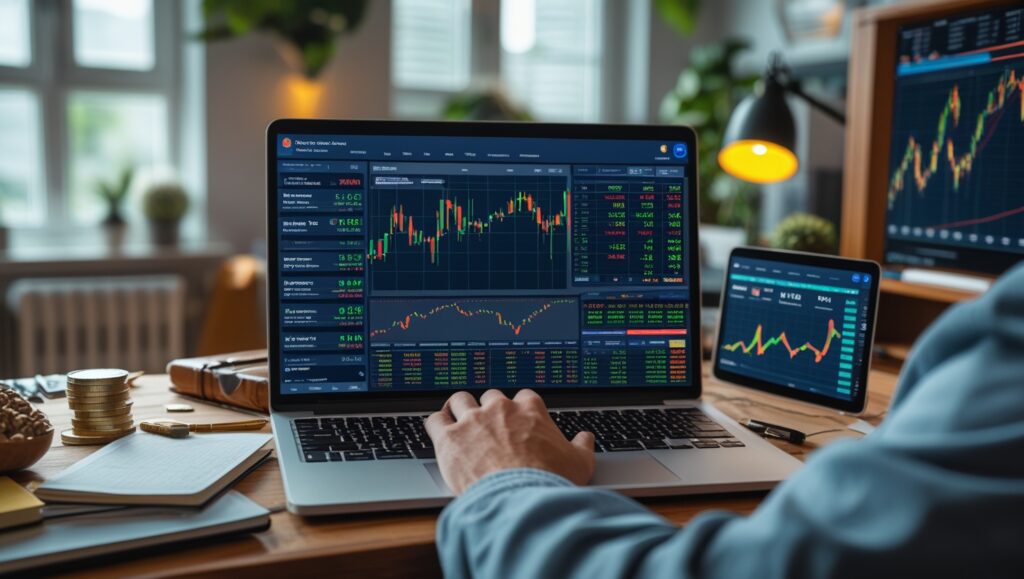So, What the Heck Is a Trade Analyzer Anyway?
If you’ve ever dealt with fantasy or encryption in fantasy sports on the stock exchange market, you’ll probably come across the term “trade analyzer.” And if you’re like me, your first response was, “Great… another thing I think I know better than I do.”
Trade Analyzer is a tool that evaluates the value of a trade, whether or not you move players in your investment portfolio assets. We use data, algorithms, and sometimes community feedback to tell you whether you are taking a great step or making a big mistake.
And honestly? Sometimes they work. In other cases, there is a sense that it is coded by someone who has never seen a football game or has never bought a single share.
My First Brush With a Trade Analyzer
Let me tell you about the first time I tried using a trade analyzer.
I was knee-deep in a fantasy football season and flailing. A buddy sent me a link to a Reddit thread that promised “The Only Trade Tool You’ll Ever Need.” Intrigued, I clicked it.
Long story short: I tried to input a Tesla stock trade into a fantasy football analyzer.
Whoops.
But that mishap sent me down a rabbit hole of trade analyzers, and before I knew it, I was testing them like a man possessed.
The Good, the Bad, and the Meh of Trade Analyzers
Here’s the deal: not all trade analysts are created equal.
The Good: Some tools genuinely help. They pull real-time data, assess risk, and even simulate how your portfolio or team might perform post-trade. I’ve had a few tools point out red flags I completely missed.
The Bad: Some are all sparkle and no substance—charts that look pretty but tell you nothing useful, or tools that use outdated data.
The Meh: These are the tools that technically work, but don’t give you any new insight. They just confirm what you already suspected.
Fantasy Sports Trade Analyzers: Blessing or Bust?
If you’re in a fantasy league, you know the drama that goes hand in hand with deals. GIVE: Trade Analyzer.
ESPNS tools are solid, but can be overly optimistic. Yahoo is more balanced, but sometimes it’s way too conservative. Sleep is slim and fast, giving decent feedback.
But here’s what I learned on a hard tour. Analysts can’t predict breakout games or surprise benches. Use them, but don’t replace common sense (or applause).
Trade Analyzers in the Stock Market World
Here things become dicey.
Platforms like Robinhood, Webull, and Thinkswim have trade analytics tools that provide recommendations based on trends, volumes, analyst reviews, and more. But they need to remember – they are still just tools.
I sometimes use Webull’s “smart scores” but only in combination with my research. There are no tools to make up for breaking news or unexpected dips (thank you, get reports).
When I Tried to “Outsmart” the Algorithm
There became every week in 2023 after I noticed I cracked the code. I became a jogging trader through 5 exceptional analyzers, tweaking variables, cross-checking Reddit predictions…
I made a massive circle primarily based on one analyzer calling for “90% upside.” Two weeks later? The inventory tanked.
Lesson learned: analysts are assistants, now no longer decision-makers. They can nudge you in the proper direction; however, the responsibility (and the fallout) is all yours.
How Accurate Are These Tools—Really?
Great question.
I ran a tiny experiment last year: I made ten trades—five in fantasy football, five in stocks—based entirely on analyzer suggestions.
The results? Around 60% were “wins.” Not bad, not great. It taught me that the best analysts are good at flagging risk and surfacing trends. But they’re not magic 8-balls.

What Makes a Trade Analyzer Worth Using?
Here’s my checklist:
- Simple, clean UI – If I need a tutorial just to input my data, I’m out.
- Real-time updates – Tools that use last week’s numbers? Nope.
- Community input – Especially in fantasy sports, crowd wisdom can be gold.
- Transparency – I want to know where the data comes from.
If an analyzer hits all four, I’m probably bookmarking it.
Free vs. Paid Trade Analyzers
Some of the best tools I’ve used are 100% free. Others, sadly, charged me $15/month to tell me things I already knew.
That said, if you’re managing serious money or playing in a high-stakes league, a good paid tool can be worth it for peace of mind and advanced features.
But for most folks? Stick to the freebies. They’re better than you’d think.
Tips for Getting the Most Out of Any Trade Analyzer
A few quick tips from a guy who’s tested too many of these:
- Use multiple tools for big trades.
- Pair analyzer feedback with news and trends.
- Don’t use them emotionally—if you’re trying to “prove” a trade is good, you’ll find a tool that agrees with you. (Guilty.)
Unexpected Ways I’ve Used Trade Analyzers
Believe it or not, I’ve used trade analyzers for:
- Crypto swaps (with mixed results)
- Collectible card trading
- Decluttering old gadgets—some tools analyze resale value and market trends. Helped me get top dollar for an old iPhone!
Once you start thinking like a trader, everything becomes a market. 😅
A Few YouTubers and Bloggers Who Do It Better Than I
I’m no guru, so here’s who I follow when I want to learn more:
- Jeremy – Financial Education (stocks with personality)
- The Fantasy Footballers (best balance of fun + insight)
- DataDash (crypto without the hype)
These folks know their stuff and make learning enjoyable.
The Future of Trade Analyzers
Trade analyzers are evolving—fast.
We’ve already seen AI-based tools such as “Hey, they usually regret stores like this” and other things like “What?”, behavioural patterns, and even nudges.
Future? I wouldn’t be surprised if they integrated into smartwatches or calendars to suggest shops based on mood, timing, and market activity.
Slightly creepy. Super cool.
My Top 5 Trade Analyzer Tools (After Trying 20+)
Here’s my honest list of favorites:
- FantasyPros Trade Analyzer – Best for fantasy sports by a mile.
- Webull’s Smart Score – Quick, simple stock sentiment.
- Koinly – Amazing for crypto tax and analysis.
- ThinkOrSwim Analyzer – Deep features for serious traders.
- Yahoo Fantasy Trade Tool – Surprisingly accurate and user-friendly.
Bonus shoutout to Koinly. It saved me from a tax nightmare.
Conclusion: Trade Analyzers Are Cool, But…
If you’ve made it this far, here’s the takeaway: alternate analyzers may be exquisite helpful—however, most effective in case you used wisely. They’re no longer replacements for studies or experience, and they’re truly no longer perfect.
Treat them like clever friends. Listen, learn, question, and in no way comply blindly.
Because on the give-up of the day, it’s your money (or bragging rights) at the line.
FAQs
What’s the best free trade analyzer?
FantasyPros for fantasy, and Webull’s Smart Score for stocks.
Can I use a trade analyzer for crypto?
Absolutely. Koinly, CoinMarketCap, and TokenMetrics are great.
Are fantasy football trade analyzers worth it?
Yes, especially for trade evaluation and second opinions.
How often should I use a trade analyzer?
Whenever you’re considering a big move or feeling unsure, don’t overuse them.
Do professionals use these tools?
Yes, though usually more advanced or custom-built ones. Even pros like backup.
